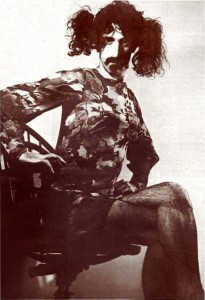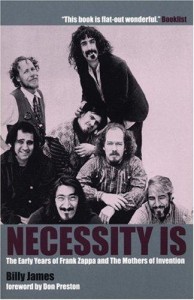(Billy James; 223 pages; SAF Publishing; 2001, Revised 2005) A REVIEW FROM THE VAULTS
Pieced together from various interviews with early band-mates conducted and compiled by the author, NECESSITY IS delves into the psyche of one of the true musical geniuses of the past half-century (maybe the only one, in fact): Frank Vincent Zappa. Mister James (a musician himself, who has worked with many of the Mothers quoted) is obviously a fan, and that’s alright. Really, unless an author wishes simply to vilify another person (or organization), why would he write about someone he wasn’t a fan of? It’s obvious, as well, that most of the gentlemen interviewed were/are fans of Frank and remained in contact with him until his death in 1993. That doesn’t mean that every quote or remembrance is pleasant. As is the case with many struggling bands (especially one with a dominant figure like Zappa), disagreements – and downright vicious fights – arose. The early Mothers (1964-1971) was a revolving door of jazz, rock, and avant-garde musicians, all struggling to be heard over (through?) the mayhem orchestrated by composer/arranger/guitarist Zappa.

Zappa was known as a task-master and this book confirms that estimation. Many of the quotes from original drummer Jimmy Carl Black, keyboardist/electronics genius Don Preston, multi-instrumentalist Bunk Gardner, and others relay (sometimes humorously) the love/hate relationship between the band and Zappa. Indeed, as Frank’s dominance and creative genius materialized, the original core group – the band who recorded the first album, FREAK OUT (1966) – of drummer Jimmy Carl Black, bassist Roy Estrada, vocalist Ray Collins, and guitarist Elliot Ingber were either forced to take a back seat to more “advanced” musicians (those who could read music, like Gardner, Preston and Ian Underwood) or asked to leave the group. In the case of Ingber, the first to be ousted from the band, a predilection for drugs was his downfall (highlighting Zappa’s strong anti-drug stance and no nonsense approach to his leadership role, Ray Collins remembers, “…He maybe smoked a little bit too much.” in regards to Ingber’s “drug abuse” and subsequent dismissal from the band). Ingber famously became a member of Captain Beefheart’s Magic Band, as Winged Eel Fingerling. Ray Collins seemed to wander in and out of the group, as he and Zappa butted heads or he would become disillusioned by the direction Frank was taking the band. Another problem, apparently, was money. Zappa had the group on a rigorous rehearsal schedule – several hours a day, seven days a week, holidays included – for which there was no pay. Frank and manager Herb Cohen had a habit of funneling money from paying gigs back into the organization, promising an eventual big payday for the band.
All of this information, including background and history on the individual Mothers, comes in the first chapter of the book. Rather than rewrite the book here and now, I’ll leave you to imagine, from the above capsule, the breadth and scope of NECESSITY IS as Billy James takes you through the late ’60s, the infighting and insanity of the original group, the later versions of the band with Aynsley Dunbar, Mark Vohlman and Howard Kaylan, the frightening and life-changing on-stage attack by a fan in London that crushed Zappa’s larynx and left him in a cast for a year, and, inevitably to the dissolution of the Mothers in 1971. James also goes into extensive detail regarding the lives of the principal figures after “Motherhood.” Late in the book, there is an extensive section quoting an interview with Zappa that supplies his side of the Mothers’ story, which does soften and enlighten the reader’s previous views of the dictatorial band leader. As is true in any disagreement between two (or several) people, you can probably temper both sides a bit, meet somewhere in the middle and come up with your own ideas about what really happened.

Mister James, while not an absolute master wordsmith, has produced a highly enjoyable and easily read book, covering the early history of one of the most infamous and influential bands of the rock era. With an extensive “Where Are They Now?” section, an exhaustive discography of everyone who was a part of the Mothers (including design artist Cal Schenkel) during the period covered in the book, a tour history through 1972, and a well-documented list of source materials, James has given us a history of Frank Zappa and the Mothers of Invention that should be read (and owned) by every music lover on the planet. (DT)

